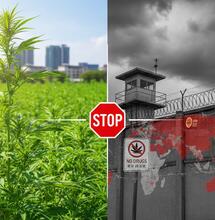Detroit Issues First Recreational Retail Licenses

The legal recreational cannabis market is extending to Detroit. The city authorities have granted the first batch of adult-use cannabis licenses to benefit 33 retailers. Michigan became a legal state back in 2018, and sales of marijuana for recreational use began in some cities across the Great Lake State by December 2019. But Detroit, the biggest city in Michigan, was marred with legal challenges and could not start licensing until now.
The end of December 2022 marks a time when a four-year legal saga in Detroit comes to a close (at least for now). It took that much time for the city of Detroit to issue the first licenses for recreational cannabis retailers after Michigan voters approved a measure on the ballot that allows adult use legalization and sales.
The first batch of 33 licenses was issued after U.S. District Judge Bernard Friedman denied a request to postpone issuing cannabis retailer licenses.
The lawsuit challenged Detroit's regulation, which has provisions that foresee business ownership within the cannabis sector by local residents of Detroit and those harmed by past drug laws.
"Our goal from the day voters approved the sale of adult-use marijuana was to make sure we had a city ordinance and a process in place that provides fair and equitable access to these licenses and the courts have affirmed that we've done just that," Detroit Mayor Mike Duggan said in a statement.
The legal challenge brought to the court principally argued that the city's cannabis ordinance unfairly favored those with settled residence status. The challenge asked that the judge pause the licensing process and it was the last in a series of legal obstacles that halted Detroit licensing.
"I'm thankful for Judge Friedman's wisdom in ruling today against the Temporary Restraining Order that would have again prevented Detroit from moving forward with our current Adult-Use Marijuana Ordinance," Council President Pro-Tem James Tate, who led the drafting of the ordinance, cheered the judge's decision.
He added: "We make sure we do the right thing. I've always said — and I've been told — if you do the right thing, everything will work out. It may not happen exactly when you want it to or not always how you want it to, but eventually, it'll work out."
Subsequently, the city of Detroit issued 33 licenses for recreational marijuana retailers. Twenty of the licenses were rewarded to social equity applicants, including those from communities disproportionately impacted by the War on Drugs and those with regulated Detroit legacy status who currently live in Detroit or another disproportionately impacted community. The other 13 licenses went into the hands of non-equity businesses.
Detroit city authorities received a total of 90 applications. Up to 60 licenses were considered to be granted in the first round. However, only 33 of the applicants fulfilled the requirements for a work permit.
Earlier this year, the city also issued the first licenses for cannabis growers and processors. In the next round of licensing that will begin in early 2023, the city will grant up to 30 more retail dispensary licenses, 20 microbusiness licenses, and 20 consumption lounge licenses. One more round of retail cannabis dispensary licensing will happen in the future.
Michigan is one of the largest cannabis markets in the U.S. According to research firm Headset, the state's market worth surpassed $2 billion in 2022. In the last twelvemonth, Michigan also measured one of the most substantial growth of any market in the U.S., that of 28.2%.
"The U.S. cannabis market as a whole has struggled to grow sales in 2022 after a cannabis boom during the peak years of the pandemic," the Headset report says. "However, Michigan, like other newer adult-use markets, has managed to grow. The Great Lakes State has experienced double-digit growth by significant increases across nearly every product category."
Detroit's opening up to legal cannabis will certainly strengthen further the Michigan state market. Meanwhile, city authorities anticipate that they will have to deal with more legal challenges and obstacles in the new year, 2023.

















